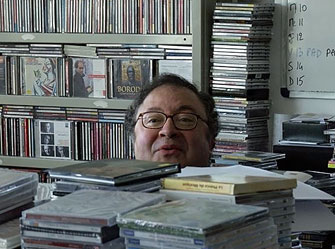
Nicolas Philibert, director of the deeply touching documentary Etre et Avoir (2002), about the relationship between a teacher and his students in a one-room schoolhouse in rural France, has turned his camera on the inner life of a beloved French institution, Radio France, in his latest documentary, La Maison de la Radio.
As soon as I heard about it, I threw on my coat and hurried to the next showing. A lifelong lover of radio, I am hopelessly addicted to one of Radio France’s eight stations, FIP, which offers a felicitous mélange of various musical genres – classical, jazz, rock, pop, blues, etc. – hosted by ladies, known as Fipettes, with soothing, honeyed voices. There is little talk and a lot of music, with a brief interruption every hour for a five-minute news broadcast. Best of all, since Radio France is state-supported, there is no advertising or begging for contributions as on the otherwise-great National Public Radio in the United States.
Having recently heard from a reporter for one of Radio France’s news stations that the Fipettes create the station’s particular ambiance by lowering the studio lights and filtering their voices with fabric draped over the microphone, I was hoping for a behind-the-scenes look at my favorite station. But, alas, the Fipettes, if they were filmed at all, must have ended up on the cutting-room floor, since there was no sign of them nor even a mention of the station during the documentary.
If Philibert had asked, I could have suggested some other cuts to make room for the Fipettes, since he has a tendency to linger just a tad too long on some of the personages who catch his fancy in the rather overlong (one hour and 43 minutes), Frederick Wiseman-style commentary-free documentary, which jumps impressionistically from one aspect of this complex world to another and returns frequently to the director’s preferred characters, most of them nameless until the titles roll.
We follow the waiter who pushes a cart laden with drinks and snacks through the curving halls in Radio France’s circular Seine-side building. We join a sound engineer in the forest, where he camouflages his microphones and settles down to record the sounds of the night. We watch a news team arguing over which stories will be cut for lack of time. We listen to the Radio France choir rehearsing and to one program’s guest playing his homemade instruments. We spy on the discomfort of nervous interviewees waiting for a broadcast to begin. And we spend an awful lot of time watching one woman Philibert seems particularly fond of as she listens to and passes judgment on recordings of actors’ performances and sound effects for a fiction program.
The documentary contains a number of poetic, humorous and fascinating moments and characters, among them the bubbly Frédéric Lodéon of France Inter, barely visible behind the towering stacks of classical CDs in his office, talking about how he knows where each disc is and when he last played it; Umberto Eco discussing his writing (he notes that even a character who strangles his grandmother contains a bit of the author); and a woman named Babette with a wonderfully warm personality taking song requests over the phone.
In the end, though, the film is really just a string of vignettes lacking in suspense. I waited in vain for the magic I expected to appear as the camera penetrated this secret world that is never seen, only heard.
Favorite
